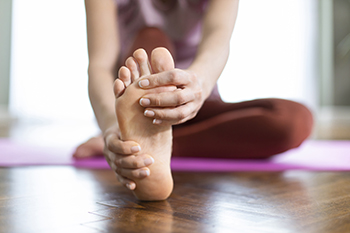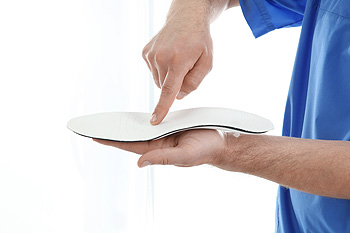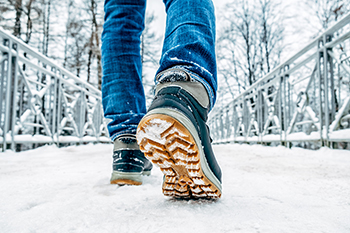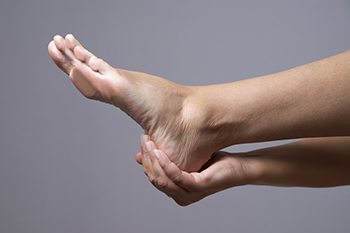Connect With Us
Blog
Items filtered by date: February 2023
Toe Pain and Sugar

Toe pain, although it might not seem like a significant concern at first glance, can be very painful and uncomfortable if not properly managed. Many different things can cause toe pain. Potential causes include blunt force trauma, for example. Interestingly, however, toe pain can sometimes be linked to sugar. Very high levels of blood sugar in certain individuals can lead to diabetic neuropathy. In turn, this might lead to uncomfortable feelings of numbness or tingling in the toes. If you are someone that already has diabetic neuropathy or might be susceptible to developing this condition, consider contacting a podiatrist immediately for treatment. A podiatrist is a trusted medical professional that can answer any questions you might have and provide effective treatment. It is suggested that you schedule an appointment today.
Toe pain can disrupt your daily activities. If you have any concerns, contact one of our podiatrists of Sutera and Jones Surgical Podiatry. Our doctors can provide the care you need to keep you pain-free and on your feet.
What Causes Toe Pain?
Most severe toe pain is caused due to a sports injury, trauma from dropping something heavy on the toe, or bumping into something rigid. Other problems can develop over time for various reasons.
Toe pain can be caused by one or more ailments. The most common include:
- Trauma
- Sports injury
- Wearing shoes that are too tight
- Arthritis
- Gout
- Corns and calluses
- Hammertoe
- Bunions
- Blisters
- Ingrown toenails
- Sprains
- Fractures (broken bones)
- Dislocations
When to See a Podiatrist
- Severe pain
- Persistent pain that lasts more than a week
- Signs of infection
- Continued swelling
- Pain that prevents walking
Diagnosis
In many cases the cause of toe pain is obvious, but in others, a podiatrist may want to use more advanced methods to determine the problem. These can range from simple visual inspections and sensation tests to X-rays and MRI scans. Prior medical history, family medical history, and any recent physical traumatic events will all be taken into consideration for a proper diagnosis.
Treatment
Treatments for toe pain and injuries vary and may include shoe inserts, padding, taping, medicines, injections, and in some cases, surgery. If you believe that you have broken a toe, please see a podiatrist as soon as possible.
If you have any questions please feel free to contact one of our offices located in Media, Glen Mills, Riddle Memorial Hospital, and Concordville, PA . We offer the newest diagnostic tools and technology to treat your foot and ankle needs.
Orthotics May Help Specific Foot Conditions

Another name for orthotics is insoles. The difference between the two can be that orthotics can be custom-made to fit an individual's foot, which can help to normalize abnormal foot structure. Patients who have flat feet may benefit from wearing orthotics which may help to reduce existing pain. They can gradually realign the foot and improve overall foot mechanics. The type of orthotics that are suggested often depends on the reason they are needed, which may come from having endured an injury or from an ongoing foot condition. The orthotics are sized by taking an impression of the foot, which is commonly done by having a plastic mold developed or by having a 3-D laser scan performed. Some of the foot conditions that can possibly be improved by wearing orthotics include bunions, flat feet, high arches, or rheumatoid arthritis. If you have foot pain, it is suggested that you consult with a podiatrist who can create custom orthotics if this is the correct choice for you.
If you are having discomfort in your feet and would like to try orthotics, contact one of our podiatrists from Sutera and Jones Surgical Podiatry. Our doctors can provide the care you need to keep you pain-free and on your feet.
What Are Orthotics?
Orthotics are inserts you can place into your shoes to help with a variety of foot problems such as flat feet or foot pain. Orthotics provide relief and comfort for minor foot and heel pain but can’t correct serious biomechanical problems in your feet.
Over-the-Counter Inserts
Orthotics come in a wide variety of over-the-counter inserts that are used to treat foot pain, heel pain, and minor problems. For example, arch supports can be inserted into your shoes to help correct overarched or flat feet, while gel insoles are often used because they provide comfort and relief from foot and heel pain by alleviating pressure.
Prescription Orthotics
If over-the-counter inserts don’t work for you or if you have a more severe foot concern, it is possible to have your podiatrist prescribe custom orthotics. These high-quality inserts are designed to treat problems such as abnormal motion, plantar fasciitis, and severe forms of heel pain. They can even be used to help patients suffering from diabetes by treating foot ulcers and painful calluses and are usually molded to your feet individually, which allows them to provide full support and comfort.
If you are experiencing minor to severe foot or heel pain, it’s recommended to speak with your podiatrist about the possibilities of using orthotics. A podiatrist can determine which type of orthotic is right for you and allow you to take the first steps towards being pain-free.
If you have any questions please contact one of our offices located in Media, Glen Mills, Riddle Memorial Hospital, and Concordville, PA . We offer the newest diagnostic and treatment technologies for all your foot and ankle needs.
Cold Weather Professions

Many people have professions that require standing for most of the day. These may include outdoor jobs, and temperatures may become cold. It is important to have knowledge about how to protect your feet from the cold while working, and this is beneficial to maintaining proper circulation. If the feet are not properly protected from the cold, the body will gradually start to ration the blood supply and redistribute it to the heart, lungs, and other organs. When this happens, less blood flow is going to the feet, which may lead to getting frostbite or immersion foot syndrome. Good foot protection from the cold begins with wearing the correct shoe size. It is helpful to measure the feet properly, and this can determine what the right shoe size is. It is suggested that boots or shoes that are worn for the cold weather are made with heavy insulation, in addition to anti-slip soles that are designed for walking on wet or slick surfaces. If your profession involves working outside in cold weather, it is suggested that you confer with a podiatrist for advice to help you determine what shoes are best for you.
While working on the feet, it is important to take the proper care of them. For more information about working on your feet, contact one of our podiatrists from Sutera and Jones Surgical Podiatry. Our doctors will treat your foot and ankle needs.
Working on Your Feet
Standing on your feet for long periods of time can cause stress and pain in your feet. Your whole body may experience change in terms of posture, back pain, bunions, callouses and or plantar warts. There are ways to avoid these conditions with proper foot care, smart choices and correct posture.
Positive Changes
Negative heeled shoe – Choosing this shoe type places the heel slightly lower than the ball of the foot. These are great for overall foot health. Find shoes that fit you correctly.
Go barefoot – Our feet were not designed to be enclosed for all hours of the day. Try to periodically expose your feet to air.
Eliminate Pain
Foot Exercises – Performing simple exercises, incorporating yoga and doing stretches are beneficial. This will allow increased blood flow to the area and muscles of the foot.
Achilles tendon – Stretching the foot out flat on the floor will relax the calf muscles and tendon. These exercises can be performed almost anywhere. Make sure you add these exercises to your daily regimen.
With a little bit of this information and knowing more about foot health, you will notice changes. Foot stretches and proper footwear will help with pain and prevent further issues.
If you have any questions please feel free to contact one of our offices located in Media, Glen Mills, Riddle Memorial Hospital, and Concordville, PA . We offer the newest diagnostic and treatment technologies for all your foot and ankle needs.
Heel Pain Can Be Treated!
Facts About Heel Pad Syndrome

Many people who experience heel pain have developed a common condition called plantar fasciitis. But the same type of pain may also be the result of heel pad syndrome. The heel pad, medically known as corpus adiposum, is actually a number of fat chambers wrapped in connective tissue at the bottom of the heel bone. The heel pad serves as a kind of shock absorber every time you stand, walk, run, or jump. When you are young and healthy, the heel pad is thick and dense. But as you age, it becomes thinner and less elastic, thereby less able to absorb the same amount of force it once did. Patients with heel pad syndrome may have a bruised heel that is tender to the touch. Walking barefoot or on hard surfaces and carrying extra body weight can contribute to the pain. Adequate heel padding, heel cups, and proper footwear are ways of reducing the pain of heel pad syndrome. In some cases, non-steroidal anti-inflammatory medication can be a treatment option. A podiatrist can examine your heel to determine if heel pad syndrome is the cause of the discomfort and offer the appropriate treatment options.
Many people suffer from bouts of heel pain. For more information, contact one of our podiatrists of Sutera and Jones Surgical Podiatry. Our doctors can provide the care you need to keep you pain-free and on your feet.
Causes of Heel Pain
Heel pain is often associated with plantar fasciitis. The plantar fascia is a band of tissues that extends along the bottom of the foot. A rip or tear in this ligament can cause inflammation of the tissue.
Achilles tendonitis is another cause of heel pain. Inflammation of the Achilles tendon will cause pain from fractures and muscle tearing. Lack of flexibility is also another symptom.
Heel spurs are another cause of pain. When the tissues of the plantar fascia undergo a great deal of stress, it can lead to ligament separation from the heel bone, causing heel spurs.
Why Might Heel Pain Occur?
- Wearing ill-fitting shoes
- Wearing non-supportive shoes
- Weight change
- Excessive running
Treatments
Heel pain should be treated as soon as possible for immediate results. Keeping your feet in a stress-free environment will help. If you suffer from Achilles tendonitis or plantar fasciitis, applying ice will reduce the swelling. Stretching before an exercise like running will help the muscles. Using all these tips will help make heel pain a condition of the past.
If you have any questions please contact one of our offices located in Media, Glen Mills, Riddle Memorial Hospital, and Concordville, PA . We offer the newest diagnostic and treatment technologies for all your foot and ankle needs.
Blog Archives
- March 2025
- February 2025
- January 2025
- December 2024
- November 2024
- October 2024
- September 2024
- August 2024
- July 2024
- June 2024
- May 2024
- April 2024
- March 2024
- February 2024
- January 2024
- December 2023
- November 2023
- October 2023
- September 2023
- August 2023
- July 2023
- June 2023
- May 2023
- April 2023
- March 2023
- February 2023
- January 2023
- December 2022
- November 2022
- October 2022
- September 2022
- August 2022
- July 2022
- June 2022
- May 2022
- April 2022
- March 2022
- February 2022
- January 2022
- December 2021
- November 2021
- October 2021
- September 2021
- August 2021
- July 2021
- June 2021
- May 2021
- April 2021
- March 2021
- February 2021
- January 2021
- December 2020
- November 2020
- October 2020
- September 2020
- August 2020
- July 2020
- June 2020
- May 2020
- April 2020
- March 2020
- February 2020
- January 2020
- December 2019
- November 2019
- October 2019
- September 2019
- August 2019
- July 2019
- June 2019
- May 2019
- April 2019
- March 2019
- February 2019
- January 2019
- December 2018
- November 2018
- October 2018
- September 2018
- August 2018
- July 2018
- June 2018
- May 2018
- April 2018
- March 2018
- February 2018
- January 2018
- December 2017
- November 2017
- October 2017
- September 2017
- August 2017
- July 2017
- June 2017
- May 2017
- April 2017
- March 2017
- February 2017
- January 2017
- December 2016
- November 2016
- October 2016
- September 2016
- August 2016
- July 2016
- June 2016
- May 2016
- April 2016
- March 2016
- February 2016
- January 2016
- December 2015
- November 2015
- October 2015
- September 2015
- August 2015
- July 2015
- June 2015
- May 2015
- April 2015
- March 2015
- February 2015
- January 2015
- December 2014
- November 2014
- October 2014
- September 2014

